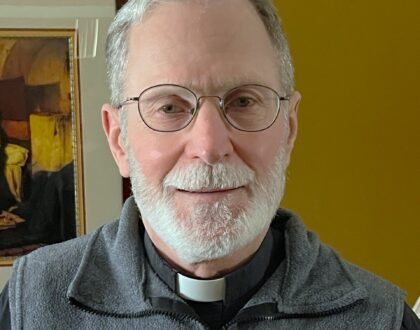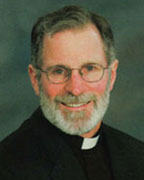Homily, October 8, 2023

From The Pastor
In the fast pace of our consumerist culture, with the overload of flash point news and the manipulative influence of social media, it is difficult to sustain a sense of personal presence. Our present-day culture screams for our attention, vying for our political, economic, and social allegiance that makes it quite easy to lose a sense of personal presence that honors our true inner nature. Human consciousness in an age of artificial intelligence challenges our ability to be present to ourselves in the dignity of our spiritual nature. So much external stimulation and manipulation of social bias stresses our ability to focus on the active presence of God.
The ability to be present is foundational to what it means to be human. ‘Presence’ expresses the disciplined capacity to relate to others in meaningful ways that establishes critical human relationships. It implies a consciousness towards connectedness in the ability and desire to maturely relate to others. What makes this foundational to our human nature? God is the essence of presence. God is the perfect essence of presence, relationship, and connectedness. To be human is to be in relationship. To be in relationship is to be present to others in a way that bonds of love and unity are created. God is present in any relationship of love.
As we move the tabernacle into the sanctuary, I want to take this opportunity to reflect with you on the meaning of Real Presence. We are not a culture of presence. We are a culture that annoyingly demands our attention. Presence is the maturity of disciplined choice that opens us to relationships that form bonds of love and unity. Presence draws us to the presence of God within ourselves.
Real Presence is an act of faith that believes Jesus, now risen from the dead, is fully present to us in the form of bread and wine. Any human relationship is an act of faith that trusts the sincerity and integrity of shared presence. In the case of the Eucharist, we trust the words of Jesus who promised to be with us always. On the night of the Last Supper hours before his death, Jesus took bread and said, “This is my Body given for you.” Taking a cup of wine Jesus said, “This is the cup of my Blood given for you.” In the desire of Divine love, Jesus promises to be with us always. This Divine promise establishes an eternal relationship of love through the living presence of Christ who died for the sake of our redemption and who is now alive in all who seek him.
This could not be a more personal relationship. All that Christ is, in his human and Divine nature risen from the dead, is now fully present to us in the Sacrament of the Eucharist. This presence of Jesus is personal and unique to each of us in the relationship we have with the Lord. This presence is a bond of unitive love. With faith in the Real Presence as we receive Holy Communion, Jesus in his person enters into us. As we receive Jesus, he receives us into himself. This is the communion. It is not just one way. It is two ways. He comes to us and dwells in us. He receives us into himself, and we dwell in him. He does not simply ‘take’ us. We, in our love and desire to receive him, are invited to consciously give ourselves over to Jesus. This is the holy communion of our mutual sharing in faith-filled love.
This is the fullness of what presence means in the reception of communion. It is the core of our faith because it is the core of who we are in God and who God is in us through the dying and rising of Jesus. Jesus is always fully present and longing to be received into us. The challenge to prepare in a conscious and reverent way to not only receive Jesus but also to offer ourselves to him. Presence takes two. Communion in the Eucharist is the union of the Lover and the beloved.
Part of the challenge is to learn to be present to ourselves. This calls for a focused discipline of faith and trust in God and a sincere desire to personally share in the life of the Lord Jesus. As a person in Christ how do I learn to be present to myself? Do I believe and trust in God’s love for me? In this love, do I love and accept myself as I am? Am I at home in my own skin with a positive sense of personal identity as a person of love? Am I free from binding anger, resentment, unforgiveness, or overly dependent on the culture? Can I forgive myself? Can I allow Jesus to forgive me?
Do I have a mature capacity for relationships with others that sow bonds of love, connectedness, and Christian unity? Accepting my limitations, weakness, and failures, can I surrender to the redemption of Christ and seek to be an agent of Christ in the world?
We all know the bonds of love and the presence of goodness they offer us. Jesus, in the Holy Eucharist is the source, the core, the origin of every bond of love. Be present to Jesus and receive him with love. With love surrender yourself into him.
Father John Esper
Recent Sermons

Homily, March 30, 2025
March 27, 2025

Homily, March 23, 2025
March 20, 2025

Homily, March 16, 2025
March 11, 2025

